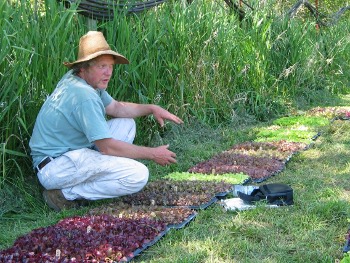eOrganic author:
Micaela Colley, Organic Seed Alliance

Frank Morton of Wild Garden Seed. Photo credit: Micaela Colley, Organic Seed Alliance
Current Projects
- The European Consortium for Organic Plant Breeding (ECO-PB)
ECO-PB works to: 1) provide a platform for discussion and exchange of knowledge and experiences, 2) initiate and support organic plant breeding programs, 3) develop the scientific principles of organic plant breeding, 4) develop standards for organic plant breeding. http://www.eco-pb.org/ - Louis Bolk Institute
The Louis Bolk Institute conducts research on, and provides new insight into, organic and sustainable agriculture, nutrition and health care. http://www.louisbolk.org/ - Northern Plains Sustainable Agriculture Society – Farmer Breeder Club
The Northern Plains Sustainable Agriculture Society has a farmer-breeder club which engages in participatory plant breeding and variety trials focusing on grains and forage crops. They work closely with researchers at NDSU. http://www.ag.ndsu.nodak.edu/carringt/05data/05%20Annual%20Report/NPSAS%... - Organic Seed Alliance
Organic Seed Alliance engages in participatory, on-farm plant breeding with organic farmers, professional plant breeders, and end users. OSA also teaches classes on fundamentals of organic plant variety improvement. http://www.seedalliance.org/index.php?page=Research - Practical Perennials: Partnering With Farmers To Develop A New Type Of Wheat Crop
Michigan State University-Kellogg Biological Station under the direction of Dr. Sieglinde Snapp, Dept. of Crop and Soil Sciences, has received a USDA Organic Research and Extension Grant to partner with farmers to develop perennial wheat (Triticum aestivum x Thinopyrum intermedium). Perennial wheat is a new type of crop – it is not expected to replace annual wheat but to provide a complementary option for farmers seeking longer-term ground cover and a specialty grain crop. The research is in the early stages, but perennial wheat lines have been identified (from Washington State University and the Land Institute in Kansas) and are in the process of being screened in Michigan, for the ability to produce marketable grain and to regrow year after year. The next stage will be to work with organic farmers to assess the most promising lines. It will take time before seed is available from initial screening, but on-farm testing will be the next step. We anticipate that selected perennial wheat lines will offer an alternative crop rotation for organic farmers and create a niche market for unique wheat flour, and possibly a ‘dual use’ crop that can be grazed. Building soil organic matter and a healthy soil food web are other benefits anticipated from this new crop. This work can be followed on the KBS website under Dr. Sieglinde Snapp’s page http://www.kbs.msu.edu/research/faculty/131. If you are an organic farmer and have ideas or questions about this crop please send them to Sorrone@msu.edu. We will offer field days in the upcoming seasons so let us know if you would like to receive these announcements.
Projects no longer funded
- Organic Seed Partnership
The Organic Seed Partnership is a consortium of public plant breeders working with organic farmers, organic seed industry and non-profit organizations to breed for organic systems and coordinate organic variety trials nationally. http://www.plbr.cornell.edu/psi/OSP%20home.htm - Public Seed Initiative (PSI)
The Public Seed Initiative (PSI) is a cooperative effort amongst the Cornell University Departments of Plant Breeding and Horticulture, the Northeast Organic Farming Association of New York, Inc, and the USDA-Agricultural Research Service’s Plant Genetic Resources Unit in Geneva, NY. http://www.plbr.cornell.edu/psi/index.html - Quality Low Input Food (QLIF)
A European consortium that seeks to lower production costs while increasing efficiency of farming systems. While not exclusively organic, the project emphasized working within an organic context. http://www.qlif.org/



